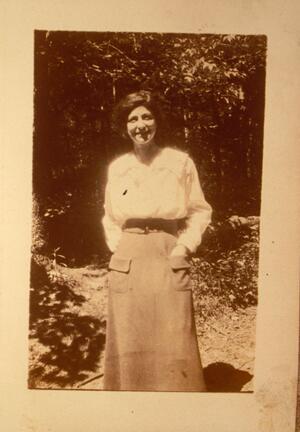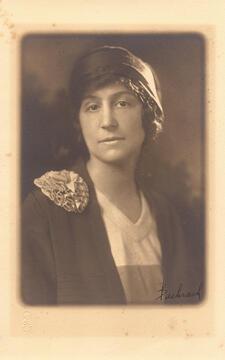Maida Herman Solomon
Maida Solomon, a professor of social economy at Simmons College School of Social Work, was recognized as a pioneer in the field, along with a very small group of social work professionals who “invented” the field of psychiatric social work and oversaw its definition, standards, and integration with other institutions of modern American medicine and education. After attending Smith College and marrying Harry Caesar Solomon, Maida Solomon began a long and distinguished career that combined research and clinical work in psychiatric social work. In 1934, she was recruited by Simmons College School of Social Work to further develop its curriculum. In addition, having four children herself, Solomon led the way for social workers who wished to combine their careers with marriage and children.
“The idea of myself as being independent, personally independent … I was clear that I wanted to marry, that I wanted a career, that I wanted to have children and I wanted to combine them all … this was 1912. I also felt … believed, rather, that women were equal to any man whom I knew … in ability, in power to make my own decisions in regard to work, life, and sex!” For Maida Herman Solomon these words became her hallmark and the guiding principles of her long and illustrious life.
Early life and education: Smith and Simmons
Born in Boston in 1891, Maida was the third daughter and last child of Joseph and Hannah (called Hennie) (Adler) Herman. Having come from Baltimore and married at age nineteen, Hennie was taken under the wing of her aunt Lina Hecht, an important philanthropist.
Lina Hecht was indeed a mentor to the impressionable Maida Herman, as much as to her mother. “It was with horror that I discovered that I didn’t originate good works on my own,” she would later say. “I inherited good works.”
Maida attended the Boston Girls’ Latin School, where the education was rigorous. When she graduated in 1908, she had no intention of following her sister Bess to Radcliffe. Bess helped Maida influence their father to allow her to break new ground and go off to Smith College. Perhaps a factor in her father’s decision to allow his youngest daughter to go away to school was Bess’s report of ethnic discrimination at Radcliffe. Joseph Herman helped set in motion a process of ethical development that started Maida on a journey toward greater independence and maturity.
She greatly valued her four years at Smith—she said that going to Smith was a “frightfully” important thing. She graduated in 1912, and throughout her life spoke proudly of her experience there. So too, Smith College was justly proud of its distinguished alumna, presenting Maida with the Smith College Medal and with the Day-Garrett Award from its School for Social Work.
The years from 1914 to 1916 were transitional. Maida was openly involved with Jewish organizations. She was accepted to the secretarial program at Simmons College, where she learned stenography and typing, graduating with a B.S. degree in 1914. In 1915, the suffrage movement became a focus in her life: Maida carried a banner at the head of a parade in downtown Boston.
Entrance into psychiatry
She married Harry Caesar Solomon, M.D., on June 27, 1916. Instead of moving away from the work force, she was drawn into a deeper involvement through the direction she found in her husband’s work, by entering the world of psychiatry. With him, she attended many staff meetings at the Boston Psychopathic Hospital (later renamed the Massachusetts Mental Health Center). She met Mary Garrett, the first social service director, who suggested that she join Harry Solomon in his research on neurosyphilitic patients, resulting in one of twenty-eight books and papers she would coauthor. Syphilis of the Innocent became a classic in its field.
It was in this setting that Maida Solomon and several others in the social service department received on-the-job training. Here, she learned the importance of integrating the theory of the classroom with practice in the clinical setting.
After starting a career that was to cover a span of over seventy years, Solomon gave birth to four children: Peter Herman, Joseph Herman, Babette, and Eric, between September 1918 and October 1928. Thus, her determination to combine marriage, a career, and a family became a reality.
Pioneering social work
Solomon’s career began to shift in the 1920s: The hospital-based psychiatric social worker and researcher became a community activist and educator. She was recruited by the Simmons College School of Social Work, with the mandate to “beef up” the mental health and psychiatric social work program at the school, a task she undertook with intelligence and gusto in 1934. Her academic title was professor of social economy.
Solomon was increasingly recognized as a pioneer in the field, along with a very small group of social work professionals who “invented” the field of psychiatric social work and oversaw its definition, its development of standards, and its integration with the other institutions of modern American medicine and education—in short, its professionalism. She helped to develop a curriculum that moved social work at Simmons from an undergraduate to a two-year graduate program with a master of science degree.
Upon her retirement from Simmons in 1957, at age sixty-five, Harry suggested that Maida return to the hospital as a consultant in social psychiatry and social work research. In this role, in which she worked into her early nineties, she helped many young professional social workers to combine their careers with marriage and children, thus transplanting her own belief system to those of her young colleagues.
After a long life and a distinguished career, Maida Herman Solomon died in January 1988 at age ninety-six.
Solomon, Maida Herman. Papers. Schlesinger Library, Radcliffe College, Cambridge, Mass., and Maida Herman Solomon Collection. Simmons College Archives, Boston, Mass., and Mrs. Maida Herman Solomon Oral Memoir. William E. Weiner Oral History Library, American Jewish Committee, New York Public Library, and Syphilis of the Innocent (1920).




